About two weeks ago Google officially announced the rollout of Penguin 4.0 and that it could now be found in the Google results. Now that the dust has settled and that first results can be found in the SERPs, I would like to summarize our present knowledge in this blog post. First of all, two points on Google’s blog post, which can be looked at as halfway secured:
Penguin 4.0 is here to stay
Up until now, Penguin mode has been as easy as it has been annoying: Google assembled all data needed and ran the algorithm for a penguin filter in irregular intervals. Results showed up in one go and pages concerned received their Google penalty in the rankings. Google has changed this procedure with Penguin 4.0. The impact is now visible once Google crawled an URL. It is still unclear if this means your own site or if the Googlebot needs to crawl the outgoing-link sites again.
The effect of Penguin is now more targeted
Delicate evaluation hasn’t been the strongest suit of the Penguin filter: either a project has been impacted in its entirety or not. Google now claims, that with Penguin 4.0 the effect of the filter will be targeted better and more precisely: on particular URLs, maybe even particular rankings.
Porn Penguin – The Biggest Winners
We have chosen 100 domains with the biggest increase between the 10 – 17 October 2016, and with a minimum visibility of 3 points. The thing that quickly catches the eye is that the biggest winners of Penguin has been the adult entertainment websites. Alone in the United Kingdom 7 domains of the top 10 winners are from this industry, in Spain are 6 and in the USA are 4.
In the UK, the most popular domain of this industry, Pornhub.com, is a part of the top 100 domains. With incredible 172 visibility points, this domain has increased its visibility by 30%. In doing so, it overcomes the visibility of big domains like Mirror.co.uk (154 visibility points), Instagram.com (143 visibility points), LinkedIn.com (140 visibility points) or Independent.co.uk (137 visibility points).
The blue Event Pins show you all official Google updates, they are displayed automatically as event pins if a domain’s Visibility has changed significantly at the same time as an update. Here are the most interesting examples:
1) Xhamster.com with 24.5 visibility points (+80%)
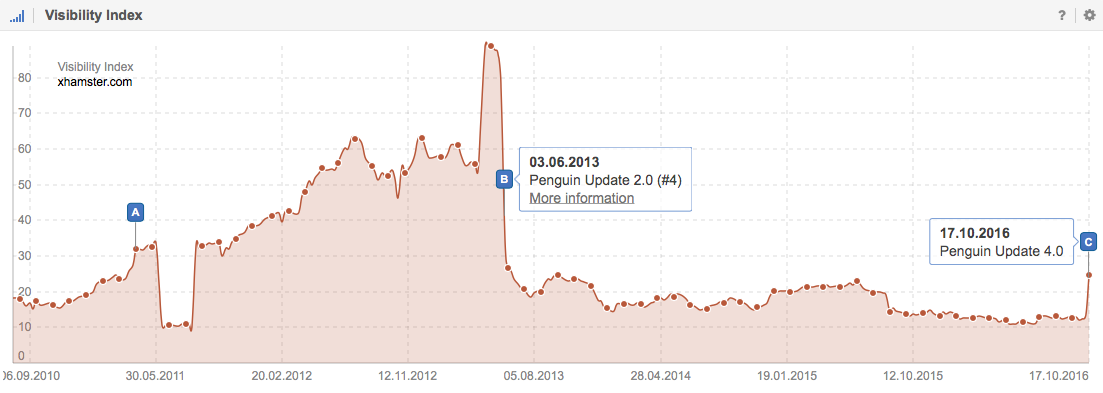
2) Watchshop.com with 11.6 visibility points (+58.7%)
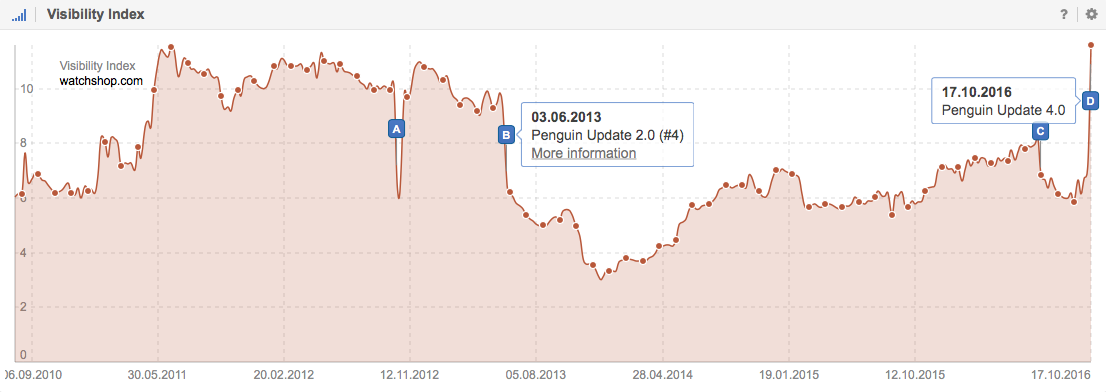
3) Bullionbypost.co.uk with 4.7 visibility points (+52.5%)
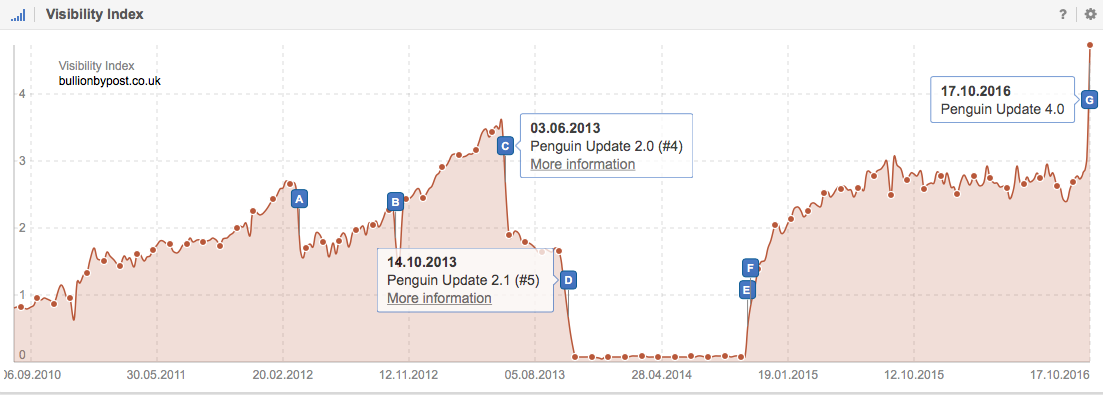
4) Ryman.co.uk with 10.6 visibility points (+44.5%)
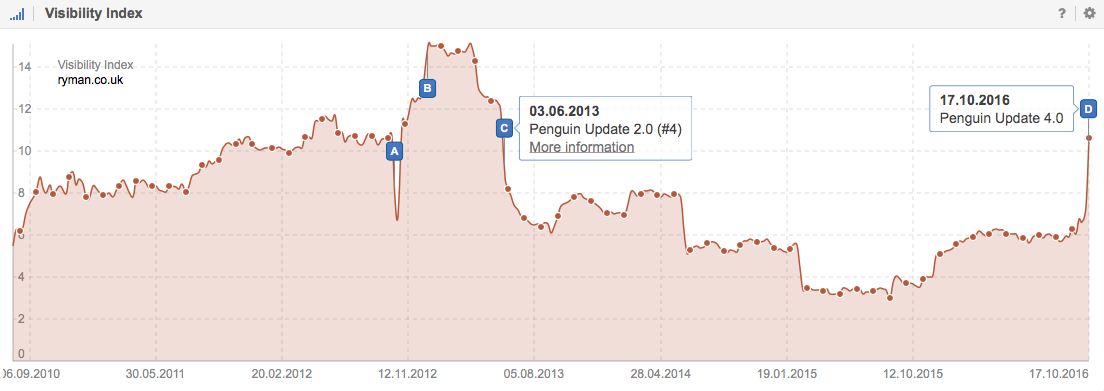
5) Motors.co.uk with 23 visibility points (+32.9%)
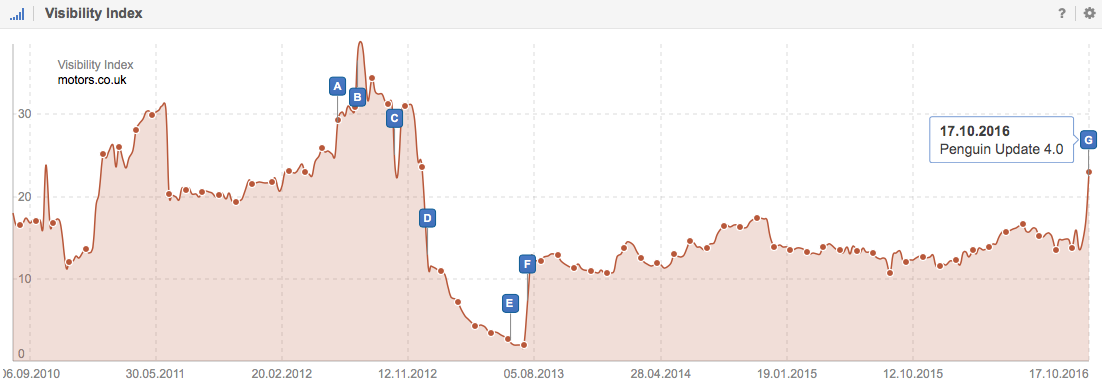
Nearly all winners have one thing in common: the fact that they will not return to their old Visibility value. This should not come as a surprise: the links, which lead to a high visibility on Google before the penalty, have been actively reduced in the meantime or are not evaluated by Google anymore.
What about the losers?
Domains impacted by Penguin have been easy to spot up until now: at the dates in which Google rolled out the new Penguin data, domains concerned have lost a lot of visibility. By using the new mode that Google introduced with Penguin 4.0, it is not as apparent anymore. Furthermore, no longer are whole domains concerned, but only individual URLs or Rankings. This makes SEO work less surprisingly a bit more intransparent and Penguin, as the clear cause, less comprehensible.
Conclusion
A lack of transparency and understanding of Penguin penalties makes SEO life difficult. The search for causes becomes more complex. From now on Penguin will be only one of about 200 ranking factors in Google’s core algorithm- anonymous and therefore not as present in public awareness. Nevertheless, or exactly because of this, the ranking relevance of Penguin will probably increase more and, in the future, qualify as one of Google’s numerous “quality updates”, just like Panda today.
Nevertheless, one should not forget the advantages of Penguin 4.0: continuous updates are very helpful especially regarding SEO business. The hopeful prospect that not complete projects but only individual URLs or rankings will be concerned, is a good one.
As Johanes Beus (SISTRIX) says: “All in all, I see more advantages than disadvantages in Penguin. The fact that SEO-business is not becoming easier is good news to those who master it”

